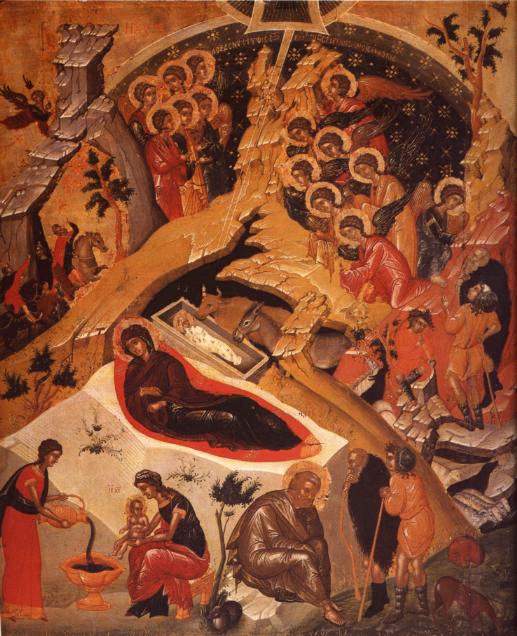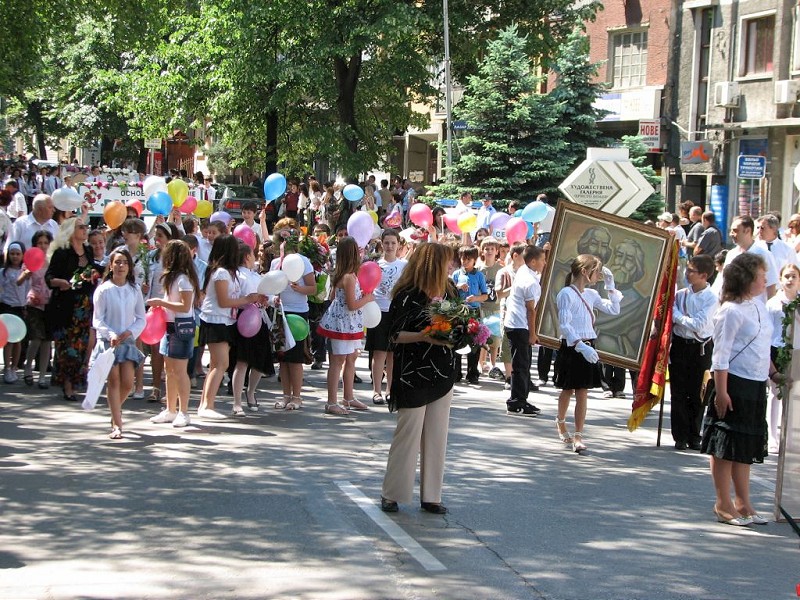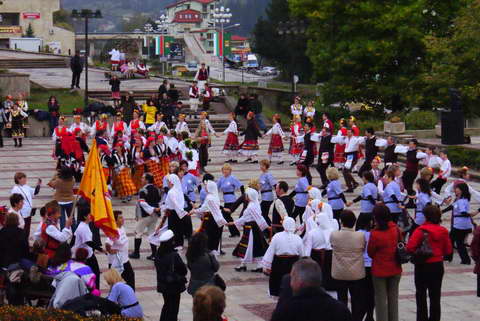
International Woman's Day was first observed in 1911, by more than a million people around the world.
Today is therefore the centennial observance, which is being celebrated with events in more than 100 countries, including Israel.
The International Woman Day (IWD) or the Triumph of Women has been growing as a great day to celebrate the achievemts of woman in history and their significance but most people know little or near nothing regarding that feast, that was disguised by the free world as it was connected to Communist countries of the United States of Soviet Republic (USSR) and today's People's Republic of China and Vietnam and only in 1975 accepted to be the International Woman Day be the United Nations.
Origin of 8 of March Woman's day
The earliest reported Women's Day observance, called "National Woman's Day", was held on February 28, 1909, in New York City, organized by the Socialist Party of America[14] at the suggestion of activist Theresa Malkiel.There have been claims that the day was commemorating a protest by women garment workers in New York on March 8, 1857, but researchers have alleged this to be a myth intended to detach International Women's Day from its socialist origin.
In August 1910, an International Socialist Women's Conference was organized ahead of the general meeting of the Socialist Second International in Copenhagen, Denmark. However, what made history for the modern celebration of International Women's Day, according to the ILO, was the fire at the Triangle Shirtwaist factory in New York City on March 25, 1911, which killed 146 young workers, most of whom were immigrants.
Inspired in part by the American socialists, German delegates Clara Zetkin, Käte Duncker, Paula Thiede, and others proposed the establishment of an annual "Women's Day", although no date was specified. The 100 delegates, representing 17 countries, agreed with the idea as a strategy to promote equal rights, including women's suffrage.
The following year, on March 19, 1911, the first International Women's Day was marked by over a million people in Austria, Denmark, Germany, and Switzerland. In Austria-Hungary alone, there were 300 demonstrations,with women parading on the Ringstrasse in Vienna, carrying banners honoring the martyrs of the Paris Commune. Across Europe, women demanded the right to vote and to hold public office, and protested against employment sex discrimination.
IWD initially had no set date, though it was generally celebrated in late February or early March. Americans continued to observe "National Women's Day" on the last Sunday in February, while Russia observed International Women's Day for the first time in 1913, on the last Saturday in February (albeit based on the Julian calendar, as in the Gregorian calendar, the date was March 8).
In 1914, International Women's Day was held on March 8 for the first time in Germany, possibly because that date was a Sunday. As elsewhere, Germany's observance was dedicated to women's right to vote, which German women did not win until 1918. Concurrently, there was a march in London in support of women's suffrage, during which Sylvia Pankhurst was arrested in front of Charing Cross station on her way to speak in Trafalgar Square.
8 of March in Modern Times the socialist faux for Annunciation
However as the Soviet system of USSR collapsed in the 1992, the feast started to take heet among other Western countries quickly, now to the point that even some country regions in Western europe do celebrate 8 of March in some kind of a form, today it is under some form celebrated or marked to more than 100+ countries.
The feast started originally in America (United States) on 27 February 1909 in New Year and has walked its way until it become official with many turmoils, public strikes of woman and woman rage. A key
What has to be said is 8 of March has been a Public feast of Great importance among all the countries from Soviet Russia (USSR) and its satellites for many years now.
In ex-USSR not venerating the woman nearby by at least flower giving is near a crime deed, and even for a traditionally Orthodox Christian countries, where there is already a feast of triumph and Veneration of woman the day of Annunciation, 8 of March is continuously celebrated even though nowadays the original meaning of the feast as a riot of woman against unequality in socity has nearly turn to a cult towards the woman for a day.
Every year, thousands of inhabitants of the planet will celebrate a world holiday – International Women's Day, which is celebrated on March 8.
But we as Christians who live in the Church should celebrate the feast of the saint commemorated respectively and not the public holiday, which of this year is Saint Teophilakt (Bishop of Necomedia).
Many of the Christian women will accept flowers from their husbands and children, many of them especially from ex-Soviet space will celebrate women's day and even require, their portion of flowers or feel ignored if they don't.
We will celebrate it too, wishfully or not almost forced … forgetting that the real day of the Mother and the woman is on March 25 on the Great and Beautiful feast of Annunciation, the date on which the Holy Theotokos (Virgin Mary) has received the Angel with the good news that she is about to become a Mother of The Lord Jesus Christ.
For the historical reference it is worthy to make a short historic review of the International Woman Day, for those who still value the feast as a feast that fits well together with the Christian doctrines.
March 8 – Women's Day, this holiday was first celebrated on February 28, 1909 in the USA at the initiative of the American Socialist Party and later become one of the leverages for Communist party worldwide to put attractiveness to their agendas.
The idea of creating an international women's day appeared after the rapid industrialization and economic expansion of the early 20th century, which gave rise to woman protests for the improvement of working conditions.
Historic time of the day is associated with the first mass demonstration of women workers, which took place on March 8, 1857 in New York.
Women from sewing and textile enterprises come out to protest against poor working conditions and low wages, which had a good point as America was a country which still tolerated even Black slavery of the time.
The female workers protesters were attacked and dispersed by the police, as this was seen as a social misconduct dangerous for society by the police officers back then.
Two years later, on the same month, these women formed their first trade union.
In the following years, other protests followed, the most famous of which was in 1908, when women organized a march through New York with demands for a shorter working day, better payment fees and the right to vote.
In 1965, March 8 was officially announced as a non-working day and women's holiday in the USSR. And even today the day is non-working in Russia and other countries of the former Soviet Union – Belarus, Moldova, Kazakhstan, Kyrgyzstan, Tajikistan, Ukraine, as well as in Macedonia and Mongolia etc as well as in Communist China and Vietnam.
In my homeland country Bulgaria (the history of the feast is entangled with the history of socialist oriented parties in it).
March 8 was initially "celebrated" with orgnized public talks in a narrow circle of socialists in 1911, in 1915 was the first public celebration, but the kingship and government back of the day did not look well towards this trend, even though tolerated it.
As a general standard Bulgarian holiday, March 8 began to be celebrated after September 9, 1944 with the raise of communism (and the communist revolution – that was very much externally imported by the USSR sent agents) at the finalizing days of World War II.
At first, following the trend of the newly installed pro-bolshevik governments, different meetings were held in various nationalized enterprises, factories, and institutions, where the contribution of women in production, culture, science, and public life was taken into account and praised.
After 1960, the celebration took on particularly wide proportions and became a favorite holiday of women and men of all ages, especially in government offices, perhaps also as an attempts for communist to show the betternes of the socialist regime installed in the country. To reinburse the feeling of the importance of the feast the day was made official non-working day, together with other partheon of imaginative feasts without much meaning, like is for example 1st of March, The day of Labor, the day of the Shepherd and other artificial communist party members made up ones.
The day since then has become a public holiday in Albania, Armenia, Azerbaijan, Belarus, Bosnia and Herzegovina, Cameroon, Kazakhstan, China, Kyrgyzstan, Cuba, Macedonia, Moldova, Mongolia, Poland, Russia, Serbia, Tajikistan, Ukraine, Uzbekistan, Montenegro and Vietnam.
As the Communist led countries parties did not have a good set of traditions, they had to set new ones and started the trend to celebrate the feast through men giving flowers to the women around them – mothers, wives, girlfriends, colleagues. As the times of Communist isolation and dictatorship in this countries was harsh time for the people, any kind of feast that can give some freshness to the gray daily routine of the working class was well and quickly accepted by society.
Gifting a flower was also advantegous for many people, as this was another way to sell flowers and make some extra cash for the poor 🙂
Internetioanl Woman Day in some of the mentioned countries including Bulgaria in the past was celebrated as the equivalent of Mother's Day, where children give small gifts to their mothers and grandmothers.
And I remember when I was still in the kindergarden, we had a task to prepare special post-cards for mom with a photo of ourselves and a written text like “Mother I love you”.
After reading this short story, it will not become clear, but for the elder people it was that the holiday was not really of a big importance and was one of the many inventions of the party to build the new communist man “homo sovieticus”.
Why 8 of March was not a considered big deal in the past?
Because in 1944, the socialist party changed a traditional holiday in Bulgaria, Mother's Day, and instead of the Annunciation, that was already a public holiday dedicated to the mother / women on 25 of March, the date was moved to March 8.
A proof to that is in history, here is what was said in a message to Radio Sofia in year 1943.
– "On the Annunciation., His Eminence Metropolitan Stefan will celebrate in the metropolitan church "Saint Sophia", a temple holiday of the same, the bishop's Holy Liturgy, and the day before – a great bishop's vespers with Pentecost at 6 p.m. In 4:30 p.m. on the occasion of Mother's Day, on behalf of the church and the women's committee from the brotherhood, our famous writer and public figure Konstantin Petkanov will speak in the "Saint Sophia" church, on the topic: The Christian heart of the Bulgarian woman ". Before and after the story, the church choir will perform appropriate chants.”
This is how our ancestors celebrated mother's day, on the day of the Mother of God, when the archangel announced the great joy that the Messiah would come to redeem the world from sin. And about whether the Christian woman is equal to the man, that should be clear, for anything who has a head. By simple physiologyand psycho-somatism, woman and man are different, however in spiritual sense in the eyes of God both male and female are equal and wonderfully made by the Good god.
A proof for the spiritual equality of man and woman are the words of Saint Apostle Paul, who says:
"There is neither Jew nor Greek; there is neither slave nor free; there is neither male nor female; for you are all one in Christ Jesus." (Gal. 3:28).
In the Church, this is also the interesting and captivating thing, that everyone has their place there where he is set on, their work, their home, everyone is given his own talent to develop.
Eight of March Epitaph
Showing respect and appreciation for a woman by bying her a flower on 8th of March is a good thing, but then again this can be done any other day and each of us man who love and venerate our mothers and wifes do it every now and then.
There is also little known facts, that one who digs deeper in history of 8 of March will certainly found, which can stun him and not everything around the feast is so white and shiny as most people thing nowadays.
But of course it is rather better to make the flower gift on the true feast when the Church and the elements and universe together with it celebartes it, and on the date when our ancestors venerated their woman too for hundreds of years before us on the Annunciation.
